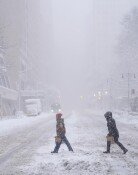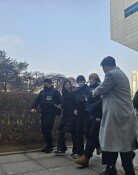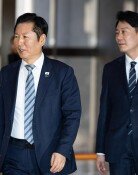65% of Koreans Say Economy Is Priority
65% of Koreans Say Economy Is Priority
Posted November. 07, 2005 07:23,
A vast majority of Korean citizens believe their financial condition has worsened since the launch of the participatory government, and most of them said solving economic problems was the most important issue for the next president to deal with.
At the request of the Dong-A Ilbo, the Korea Research Center (KRC) conducted a telephone survey on November 5 of 1,015 adults across the country. The survey showed that as many as 49.6% of respondents thought their own financial situations got worse under the current administration. Only 7.8% said the economy has picked up, and 42.2% replied the situation has remained almost the same.
When it came to what would be the best quality for the next president to properly manage state affairs, 64.7% selected insight into economic policies, which is the ability to solve economic problems. Other qualitiesthe ability to relieve social conflicts (social integration capability); international sense and insight (diplomatic capability); and the ability to lay the foundation for the reunification of the two Koreaswere endorsed by 20.2%, 10.0% and 3.7% of the respondents, respectively.
The survey also demonstrated the publics high distrust toward North Korea with regard to its nuclear programs.
Asked whether they believed North Korea would give up its nuclear ambitions if it were guaranteed the light water reactor and other energy aid, as well as the security of its regime in the wake of the forthcoming fifth round of the six-party talks, a meager 29.4% responded it would, while 70.3% predicted the North would not abandon its nuclear programs even if it was guaranteed energy aid and the security of its regime.
A total of 55.1% of those surveyed selected the United States as the nation upon which the Korean government should put its diplomatic emphasis, followed by China (28.6%), North Korea (8.0%), Japan (3.4%) and Russia (0.6%). These results reflect a significant change given that in the Dong-A Ilbos previous survey in May last year, 48.3% chose China while 38.1% selected the United States.
A total of 36.4% of the respondents said the governing Uri Party held the responsibility for its defeat in the recent re-elections and its internal conflicts, outnumbering those who believed the blame lay with President Roh Moo-hyun (26.6%). A total of 11.9% responded the responsibility should be taken by Prime Minister Lee Hae-chan and the cabinet, and 8.6% indicated presidential aides were responsible.
Asked whether they believed the current party structure centering on the Grand National Party (GNP) and the Uri Party would be sustained until the next presidential election in 2007, 30.9% said yes, while 62.6% replied there would be considerable changes in the current party structure.
A total of 68.7% of those surveyed selected the GNP as the party with the most likelihood to take power in the next presidential election; only 13.8% said the Uri Party is most likely to do so.
In terms of preference for future presidential candidates, former Prime Minister Goh Kun still remained on top (26.4%), followed by Seoul Mayor Lee Myung-bak and GNP Chairwoman Park Geun-hye, preferred by 20.5% and 19.3%, respectively. Preference ratings of ruling party candidatesUnification Minister Chung Dong-young (8.8%), Prime Minister Lee Hae-chan (3.9%) and Health Minister Kim Geun-tae (3.4%)all remained in the single digits.
The sampling error of the survey is ±3.1% with a confidence level of 95%. For more detailed information, visit the public opinion survey archives on the online edition of the Dong-A Ilbo (www.donga.com).
sunny60@donga.com







